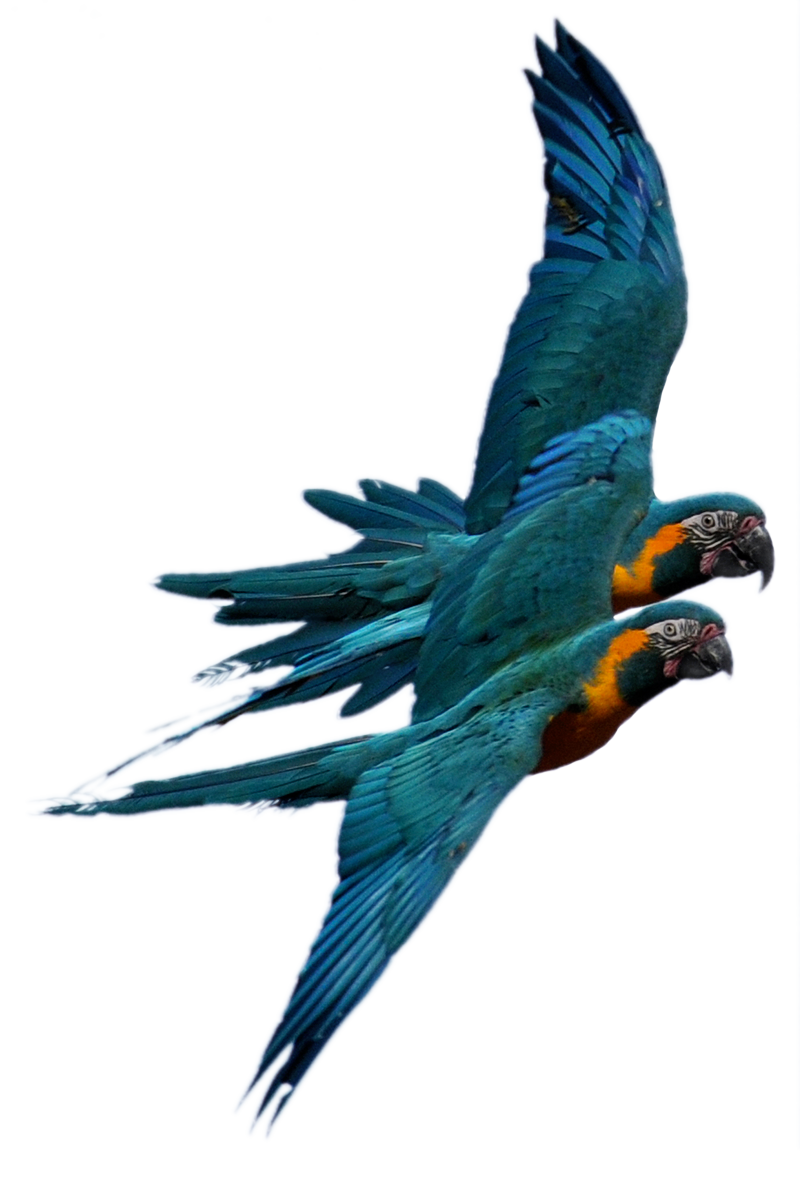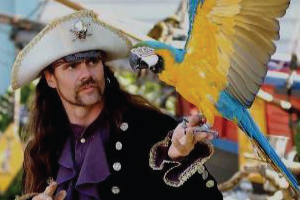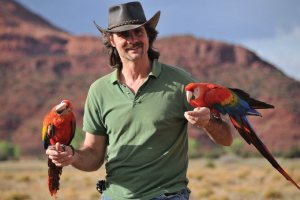
Hanging Out Time & The Matching Law
Written By Chris Biro, Copyright 2008
A List Member Wrote: “I don’t know if I want to encourage them to hang out in trees. It can be inconvenient if they choose not to respond to a cue to fly to me. On the other hand, I think they must miss something not chewing on fresh tree branches. My aviary and my cages are well equipped, but it is not the same as sitting atop a real live tree that is 30 feet tall. Comments would be appreciated.”
Not only is it not the same experience for the birds, it is also not the same from a training stand point. It is my opinion that a bird is not fully trained for out door flight unless your recall is good enough to call them out of trees that they are just hanging out in. There will be a time when your bird will figure out that it has power of choice when it is in a tree and out of your direct physical control. You need to practice working on your stimulus control and recall training in a variety of environments and conditions, including conditions where the bird has free time in a tree. Otherwise your recall will deteriorate in such conditions. This is not an easy balance to strike but if recall practice is continued on a regular basis, you should be able to keep a good recall response even when hang out time is allowed. Ariel (Scarlet) is our best at this though she certainly has her times when she acts offended or just plain disagreeable and will not come down. But most of the time she is very quick to respond to recall cues. The more often we practice this, the better she stays. If we slack off on the practice, her recall response shows this.
Recall is not a behavior that once trained lasts forever. It must be maintained with continued training. Complying with a request to come to you is not an inherent behavior and thus I would think is subject to what the Breland’s termed “instinctive drift”. It is more natural for the bird to be under its own “control and direction” rather than under your control. So the tendency is always going to be for the animal to naturally shift back under its own control unless sufficient training takes place to maintain the proper level of compliance. This is different than saying the bird needs to be hungry enough to want to comply. If the bird is responding only when it is hungry, it is not actually fully trained. A bird that is properly trained will perform the requested behavior even when not hungry.
It is also the case that hanging out in a tree is itself a very reinforcing behavior. This means that the matching law is involved. If the bird perceives it to be twice as reinforcing to sit in that tree than it finds your potential reinforcers, then the bird will be twice as likely to sit in the tree rather than come to you when called, especially if the bird thinks that it will not be allowed to resume its time in the tree after landing on you. It is a common practice of mine to immediately send them back up again after they fly down to me after a recall response. I get my best recall responses when far more often than not they are immediately sent back up to fly or hang out until called again. The main idea here is to make sure that they do not come to fear that flying down to me automatically ends the fun. We do this at times that it is really challenging to send them off again, like right after two hours of not coming when called or an overnighter – after an overnighter we have to evaluate the status of the bird before doing this: if it is a skilled bird that just had to test its ability to sleep in a tree then we send it up again; if it is a bird with minimal skills we will not send it up again. It is important to communicate to the skilled flyers that flying down as called does not mean the fun ends. The only way I know to do that is to send them back up again. This practice is a method of preventing accidental decreases in the birds motivation to comply with recall requests. It should not be done for birds that are still working on the physical skills of flying.
All trained behavior consists of two main elements, ability and willingness or skill and motivation. Janet is now at the stage of working on willingness rather than ability. So a different set of strategies will come into play. The more real world conditions are added, the more complicated the strategies are to keep motivation high enough to continue to get appropriate responses.
Once the bird reaches a level of competence of skill in flying, then the rest becomes all about motivation. There are still some skills to be learned that are not directly related to controlling actual flight, such as navigation, predator alertness and avoidance, recall compliance, flock flying skills, etc. But once these are mastered by the bird then we are all just handlers. Our differences as trainers will show through in the length of time it takes to get to this point (if we ever do get to this point <grin>) but once there I think we are all pretty much flying as equals. We will all face similar dangers and risks and similar challenges in keeping our birds responding appropriately. There will be some variation depending on the species of bird, the nature of the locations we fly in, and if flying solo or flock. When more people start reaching this stage, I think we will start to see a whole new generation of info needing to be discussed.
Parrots: More Than Pets, Friends For LifeChris Biro
Resources and More
The Pirate's Parrot Show
An educationally based pirate-themed parrot show performing at state and county fairs since 1991. The Pirate’s Parrot Show is a Fun, Educational, and Interactive experience for all ages and cultures.
Bird Recovery International
One in every eight bird species in the world today is in danger of extinction and these numbers are increasing! Find out how this non-profit organization started by Chris Biro can help save and protect parrots and other birds.
Podcasts with Chris Biro
An Alternate Perspective – Enjoy these audio Podcasts of Chris with guests discussing the nature of training flighted birds. The discussions are intended to be loosely structured around a general topic.
Email Us
chris@libertywings.com
Call Us
(206) 618-2610
Contact Us
By Using the Contact Form




Article Comments